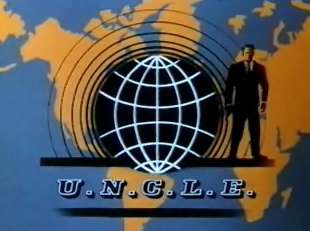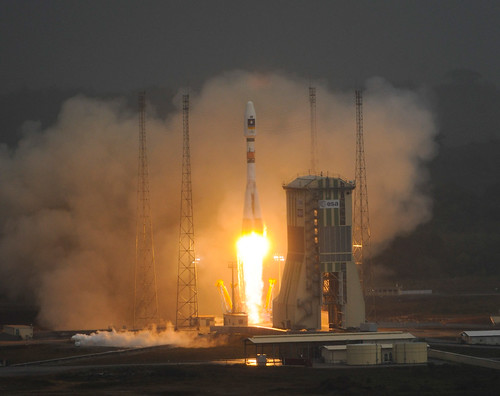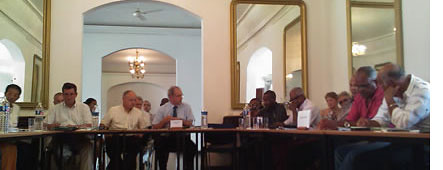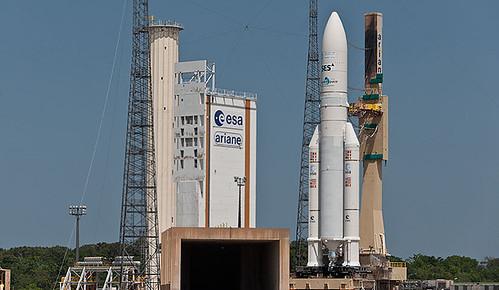The Man from Y.E.A.R. — Yukos, Eutelsat, Arianespace and Roscosmos
Monday, April 11th, 2016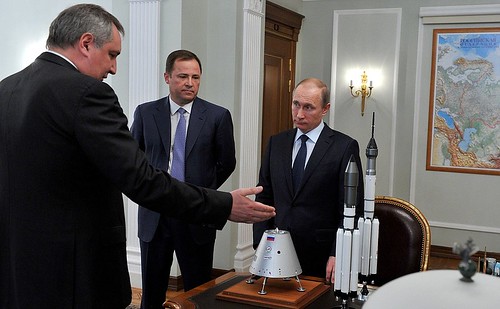
Путін Хуйло.
Remember that $50 billion arbitration award to Yukos? Well, as with any judgement award, the tougher next step is actually getting paid. If you expect Russia to simply write a checks to a former Yukos shareholders, then go fly a kite.
They threatened to start seizing assets outside of Russia, so Putin’s commanding everything they own get a diplomatic property plate slapped on it. Afterwards, many buildings in Paris became part of the Russian consulate.
So now we find a couple of asset seizures from two Paris-based entities: Eutelsat and Arianespace. The Eutelsat assets seized were related to 15-year lease on the Express AT2 spacecraft, which launched in 2014, at $400 million. The Arianespace assets are related to rocket launch service, likely related to Soyuz launchers out of Kourou, and worth $300 million.
Would you be surprised if Luxembourg was next on the list?
Not at all, given Gazprom’s involvement with SES S.A.
Here’s the story by Michael D. Goldhaber, in American Lawyer (subscription)…
The Russian social contract rests on a tacit agreement between the businessmen and politicians not to talk about their mutual corruption. In Russia’s desperation to roll back history’s biggest arbitration award, this bargain is breaking down.
In July 2014, arbitrators ordered Russia to pay $50 billion to the oligarchs from whom it seized Yukos Oil Co. At a Feb. 8 hearing to set aside this award, Russian counsel Albert Jan van den Berg told the Hague District Court: “If we want to talk about the reality of this case, we have to go back to … the disintegration of the Soviet Union.… A handful of oligarchs were robbing state-owned companies blind.” On April 20, a Dutch court will decide whether “you stole it first” is a valid defense.
In the “loans for shares” program of 1995-1996, Russia allowed a larger group of oligarchs to transfer control of a dozen major companies to themselves in exchange for loans to help Boris Yeltsin balance his budget and thwart the Communists’ return to power. Russia chose Mikhail Khodorkovsky’s Bank Menatep to hold the initial Yukos auction and share tender. Two Menatep affiliates submitted the only bids. The winner bought 33 percent of Yukos in exchange for $159.5 million, committed to invest $200 million in the company and won the right to lend the state $159 million secured by another 45 percent of Yukos.
When Russia defaulted on that loan, Menatep organized a new auction, with two Menatep affiliates again emerging as the only bidders. One bought the secured shares for $160.1 million. Menatep’s total commitment was $518.6 million. By the next year, Yukos was publicly valued at $6 billion. Other crown jewels of the Russian economy that were privatized in this creative manner include Lukoil, Mechel, Norilsk Nickel and Sibneft.
Putin tolerated Khodorkovsky until he publicly questioned the integrity of another state oil deal in 2003, as we described in our ongoing coverage.Then prosecutors tested a long list of pretexts for hounding Yukos into liquidation. They never even considered going after Yukos for rigging a state auction, because that remained business as usual. Indeed, the state would recover Yukos’ main asset in 2004 by means of—you guessed it—a rigged auction.
As the 10th anniversary of Yeltsin’s “loans for shares” approached in 2005, the Duma passed a law at Putin’s urging that cut the statute of limitations for challenging a privatization. At that moment, a legal accounting seemed unlikely either for the oligarchs stealing Yukos, or for the government stealing it back.
But before Russia dismantled Yukos, the Menatep oligarchs had passed their shares to corporate shells based in jurisdictions that signed an investment treaty with Russia known as the Energy Charter Treaty. “It looks like someone mapping the Ebola virus,” a Russian counsel says of their tangled legal structure. In 2005, three offshore affiliates of Group Menatep (now GML Ltd.) filed claims for expropriation.
With Cleary Gottlieb Steen & Hamilton defending the arbitration, Russia argued only in passing that “loans for shares” sullied the oligarchs’ hands. The arbitrators, in their 1,888-point ruling of 2014, dismissed the argument in one formalistic point. Russia had failed to adequately connect Bank Menatep’s allegedly illegal “loans for shares” scheme with the claimants’ “investment” in Russia, they concluded, because the claimant entities were separate from Bank Menatep and its oligarchs. The reasoning of paragraph 1370 struck us as the award’s weak link immediately. The arbitrators didn’t back up their assertion of corporate separateness. And they never tested the alleged illegality.
Now, Russia’s only recourse is in the Netherlands. (The day before the 2014 award, a Russian missile killed 193 Dutch citizens over the Ukraine.) At first, in January 2015, Russia told the Dutch court that “legal infirmities surrounding Yukos’ founding” were not a basis for a set-aside. Then White & Case took over Russia’s case from Cleary. With White & Case’s guidance, Russia is making “loans for shares” central to its enforcement defense in Washington, D.C., France, England, Germany, Belgium and the Netherlands.
Russia only raised “loans for shares” in Dutch court early this year. Even though it had confiscated Yukos’ share registry in 2003, Russia presented the evidence as newly discovered because “the code was not cracked until October 2015.”
Yukos’ counsel, Shearman & Sterling’s Emmanuel Gaillard, teases Russian intelligence: “It took the FSB 12 years to crack a code? This is very disappointing.”
Russia argues in its Dutch challenge that the arbitrators lacked jurisdiction because the Energy Charter Treaty does not extend a nation’s consent to arbitrate toward investors who make an illegal investment. (Russia also renews its arguments that it never ratified the treaty and that the claimants are Russian nationals, among other things.) For all the same reasons, Russia contends that the usual exception to sovereign immunity for confirming an arbitral award doesn’t apply.
As a legal matter, the Yukos camp counters that Energy Charter jurisdiction is predicated on claimants’ status as “investors,” rather than their investment’s legality. Anyhow, they say, Russia clearly waived its “loans for shares” objection.
As a factual matter, the oligarchs say that Russia knew full well that Menatep lay behind the bid for Yukos—just as the arbitrators knew full well that Menatep lay behind the arbitration. Given the dire state of Yukos and Russia in 1995, and a ban on foreign bids, they say a half-billion-dollar commitment was nothing to sneeze at.At the end of the day, the oligarchs argue that “loans for shares” were legal because they were organized, overseen, monitored and later ratified by Russia.
The Global Lawyer accepts that the Russian “sale of the century” was an open secret, and a disgrace. We’ll let the Dutch courts assess its legality. Meanwhile the cat and mouse game begins. On Dec. 17, a Paris court declined to suspend enforcement of the Yukos award pending appeal.
Gaillard complains that “Russia is busy slapping diplomatic plaques after the fact on every piece of property it owns in Western Europe.” Russia persuaded Belgium to enact a “Yukos Law,” requiring that a judge preauthorize asset attachment. It pressured Belgian diplomats and French police to block local functionaries from taking inventory at buildings the oligarchs seized. Most ominously, Russia warned in a July 15 diplomatic note that it will consider any American enforcement as grounds for retaliation against U.S. citizens and businesses.
Even so, the oligarchs have provisionally seized close to $1 billion in assets in France—including $400 million owed by Eutelsat to the Russian Satellite Communications Co. for satellite capacity and $300 million owed by Arianespace to Roscosmos for rocket launchers. One billion down, says Shearman. Forty-nine billion to go, says White & Case.
